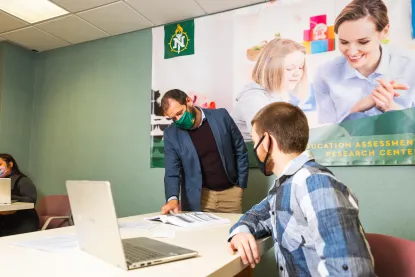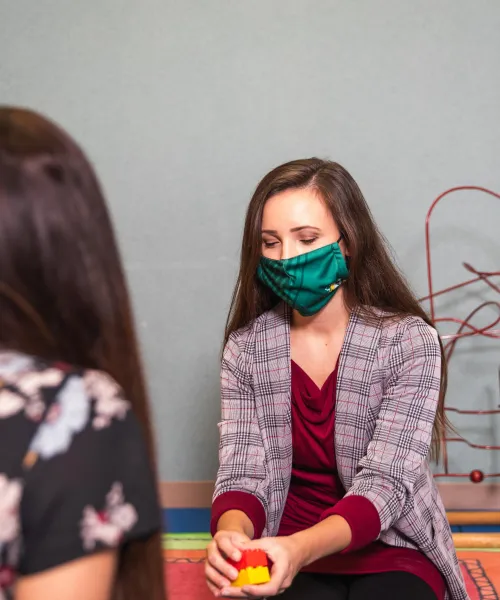
NMU expands autism and behavioral services and training - and makes a major difference in families' lives
NMU’s Behavioral Education, Assessment and Research Center received nearly $500,000 from the Michigan Health Endowment Fund to reach wider populations in more diverse settings in the Upper Peninsula, and to train more providers. The BEAR Center provides critical therapy services to individuals with autism and other behavioral disorders in underrepresented rural areas, and serves as a clinical and research site for students pursuing careers in the field.
“The BEAR Center’s mission is threefold,” said Director Jacob Daar. “It gives our community access to quality behavior analytic services, provides training and professional development to future and current behavior analysts, and facilitates student and faculty research in the areas of clinical practice and management. The grant will help us to achieve this mission in several ways.”
The center’s services were previously limited to children ages 2-6 with specific language deficits. Through the grant, they will now extend to the entire school-age population (2-22 years old) and address a wider range of behavioral difficulties. These include self-injurious and aggressive behaviors, tantrums, feeding issues and failures to remain in therapeutic or school settings.
Students gain practical experience in the campus clinic and research facility. They also travel to various U.P. locations to provide in-home and school-based consultation. Collin Hahn ’15 BS, ’ 18 MS, a behavior analyst, supervises students placed off campus.
“With Covid-19, we’ve been unable to deliver the same face-to-face services, but we’re doing the best we can with telehealth,” he said. “The U.P. is big and sparse, and there are individuals and families who can’t get services locally because of insurance or other reasons. It’s nice for them to have options and they appreciate what we can do for them. One parent emailed our staff thanking us for how much the child’s behavior in the home and the well-being of the whole family had improved,” said Hahn. “In another case, we were working with a child on language skills and a family member approached me and emotionally told me how their child asked for a snack for the first time ever. Being part of that process cemented it for me that I’m in the right field.”
Morgan Angel, a graduate student from Woodland, Mich., said telehealth relies more heavily on parental participation.
“They’ve been doing a phenomenal job with it,” Angel said. “They’re also very thankful for the progress their kids make, whether it’s increased eye contact or labeling different toys or foods they want. It’s a huge thing for parents of a child who’s nonverbal to hear noises or partial words for the first time. And for those who create a better connection through physical contact that didn’t exist before, like the parents of a child who started to snuggle with them each morning.”
Behavior analyst Victoria Mattson ’15 BS, ’17 MS works in the university clinic. “We had clients traveling up to two hours to receive services before the pandemic,” she said. “We work primarily with kids with autism, but it’s not a requirement; it can be other forms of developmental delays. We also train teachers and teacher aides how to utilize our practices to improve performance in the classroom.”
Students have also gained experience with geriatric populations. Prior to the pandemic, they performed functional behavior assessments of those with dementia and Alzheimer’s and provided recommendations to staff on how to best support residents and promote adaptive, independent living skills. Students will also work with those who’ve suffered traumatic brain injuries, a research specialty of professor Ashley Shayter.
As part of the Health Fund grant initiative, Shayter is working to increase the number of Registered Behavior Technicians in the region. RBTs are the entry-level positions in the behavior analysis field.
“There’s a big demand for behavior analysts at every level in the U.P., including this one, so students and I developed an RBT training program that meets all certification board requirements,” she said. “Our goal is to train at least 25 RBTs per year. Anyone 18 years or older with a high school degree is eligible. Once they complete 40+ hours of training and a competency assessment with us, they can become certified as an RBT and begin working—or continue toward a bachelor’s degree within our program.”

“The BEAR Center is always looking to find ways to improve clinical practice and staff training,” he added. “A component of this project is to provide the U.P. with a resource for paraprofessional training in behavior analytic strategies and techniques via a hybrid online and experiential training program. This program is a unique attempt to increase the availability and quality of behavior technician training, which we hope will support the application of competence and evidence-based best practices.”
Adam Prus, chair of the Psychological Science Department, said rural areas too often struggle to support the behavioral health needs of its community members due to limited funding and too few personnel.
“We can now creatively make enormous gains in the region’s accessibility to behavior services by providing direct care to clients at the BEAR Center clinic, utilizing telehealth services for hard-to-reach locations through NMU’s Educational Access Network, and sustaining these efforts into the future by providing online, professionally certified behavior health training to a workforce of individuals who call the U.P. home. I’m excited for the work we’ll see from the very talented BEAR Center team.”
